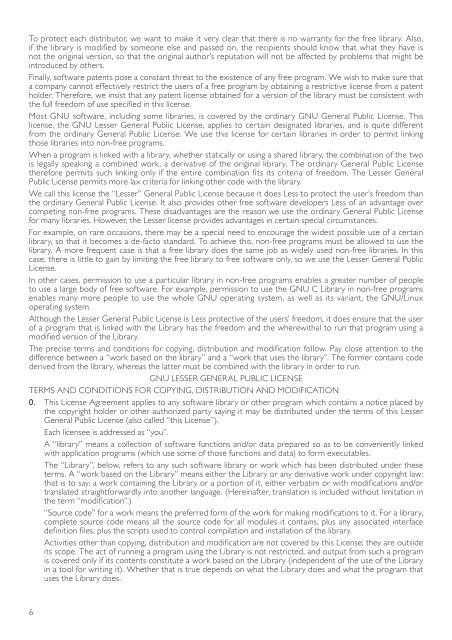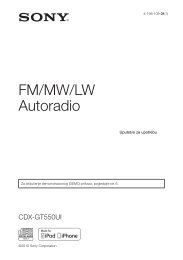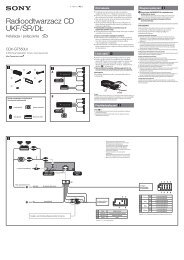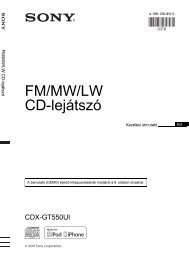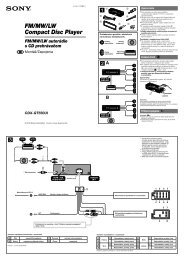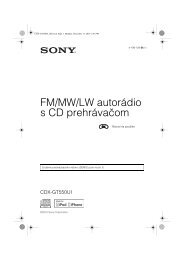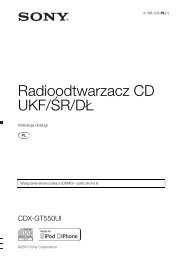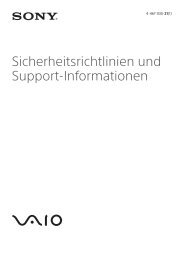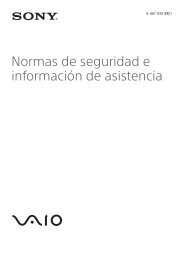Philips Lecteur Blu-ray / DVD - Mode d’emploi - HUN
Philips Lecteur Blu-ray / DVD - Mode d’emploi - HUN
Philips Lecteur Blu-ray / DVD - Mode d’emploi - HUN
Create successful ePaper yourself
Turn your PDF publications into a flip-book with our unique Google optimized e-Paper software.
To protect each distributor, we want to make it very clear that there is no warranty for the free library. Also,<br />
if the library is modified by someone else and passed on, the recipients should know that what they have is<br />
not the original version, so that the original author’s reputation will not be affected by problems that might be<br />
introduced by others.<br />
Finally, software patents pose a constant threat to the existence of any free program. We wish to make sure that<br />
a company cannot effectively restrict the users of a free program by obtaining a restrictive license from a patent<br />
holder. Therefore, we insist that any patent license obtained for a version of the library must be consistent with<br />
the full freedom of use specified in this license.<br />
Most GNU software, including some libraries, is covered by the ordinary GNU General Public License. This<br />
license, the GNU Lesser General Public License, applies to certain designated libraries, and is quite different<br />
from the ordinary General Public License. We use this license for certain libraries in order to permit linking<br />
those libraries into non-free programs.<br />
When a program is linked with a library, whether statically or using a shared library, the combination of the two<br />
is legally speaking a combined work, a derivative of the original library. The ordinary General Public License<br />
therefore permits such linking only if the entire combination fits its criteria of freedom. The Lesser General<br />
Public License permits more lax criteria for linking other code with the library.<br />
We call this license the “Lesser” General Public License because it does Less to protect the user’s freedom than<br />
the ordinary General Public License. It also provides other free software developers Less of an advantage over<br />
competing non-free programs. These disadvantages are the reason we use the ordinary General Public License<br />
for many libraries. However, the Lesser license provides advantages in certain special circumstances.<br />
For example, on rare occasions, there may be a special need to encourage the widest possible use of a certain<br />
library, so that it becomes a de-facto standard. To achieve this, non-free programs must be allowed to use the<br />
library. A more frequent case is that a free library does the same job as widely used non-free libraries. In this<br />
case, there is little to gain by limiting the free library to free software only, so we use the Lesser General Public<br />
License.<br />
In other cases, permission to use a particular library in non-free programs enables a greater number of people<br />
to use a large body of free software. For example, permission to use the GNU C Library in non-free programs<br />
enables many more people to use the whole GNU operating system, as well as its variant, the GNU/Linux<br />
operating system.<br />
Although the Lesser General Public License is Less protective of the users’ freedom, it does ensure that the user<br />
of a program that is linked with the Library has the freedom and the wherewithal to run that program using a<br />
modified version of the Library.<br />
The precise terms and conditions for copying, distribution and modification follow. Pay close attention to the<br />
difference between a “work based on the library” and a “work that uses the library”. The former contains code<br />
derived from the library, whereas the latter must be combined with the library in order to run.<br />
GNU LESSER GENERAL PUBLIC LICENSE<br />
TERMS AND CONDITIONS FOR COPYING, DISTRIBUTION AND MODIFICATION<br />
0. This License Agreement applies to any software library or other program which contains a notice placed by<br />
the copyright holder or other authorized party saying it may be distributed under the terms of this Lesser<br />
General Public License (also called “this License”).<br />
Each licensee is addressed as “you”.<br />
A “library” means a collection of software functions and/or data prepared so as to be conveniently linked<br />
with application programs (which use some of those functions and data) to form executables.<br />
The “Library”, below, refers to any such software library or work which has been distributed under these<br />
terms. A “work based on the Library” means either the Library or any derivative work under copyright law:<br />
that is to say, a work containing the Library or a portion of it, either verbatim or with modifications and/or<br />
translated straightforwardly into another language. (Hereinafter, translation is included without limitation in<br />
the term “modification”.)<br />
“Source code” for a work means the preferred form of the work for making modifications to it. For a library,<br />
complete source code means all the source code for all modules it contains, plus any associated interface<br />
definition files, plus the scripts used to control compilation and installation of the library.<br />
Activities other than copying, distribution and modification are not covered by this License; they are outside<br />
its scope. The act of running a program using the Library is not restricted, and output from such a program<br />
is covered only if its contents constitute a work based on the Library (independent of the use of the Library<br />
in a tool for writing it). Whether that is true depends on what the Library does and what the program that<br />
uses the Library does.<br />
6


